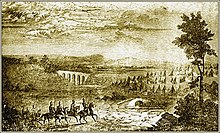
Back جايوس كلاوديوس نيرو Arabic جايوس كلوديوس نيرو ARZ Гай Клавдий Нерон Bulgarian Gai Claudi Neró (cònsol 207 aC) Catalan Gaius Claudius Nero German Cayo Claudio Nerón Spanish Gaius Claudius Nero Finnish Caius Claudius Nero French גאיוס קלאודיוס נרו HE Gaius Claudius Nero ID
Gaius Claudius Nero | |
|---|---|
 Gaius Claudius Nero takes the head of Hasdrubal to the camp of Hannibal after the Battle of Metaurus, 207 BC. | |
| Consul of the Roman Republic | |
| In office 207 BC served with Marcus Livius Salinator | |
| Preceded by | Marcus Claudius Marcellus and Titus Quinctius Crispinus |
| Succeeded by | Quintus Caecilius Metellus and Lucius Veturius Philo |
| Personal details | |
| Born | before 237 BC |
| Relations | Claudia gens |
| Military service | |
| Allegiance | Rome |
| Branch/service | Roman army |
| Battles/wars | Second Punic War: |
Gaius Claudius Nero (c. 237 BC – c. 189 BC) was a Roman general active during the Second Punic War against the invading Carthaginian force, led by Hannibal Barca. During a military career that began as legate in 214 BC, he was praetor in 212 BC, propraetor in 211 BC during the siege of Capua, before being sent to Spain that same year. He became consul in 207 BC.[1]
He is most renowned for his part in the Battle of the Metaurus, fought alongside his co-consul and great rival Marcus Livius Salinator against Hannibal's brother Hasdrubal, for which he was awarded an ovation. The Roman victory at Metaurus River in 207 BC is widely seen as a daring strategic masterstroke by Claudius who surreptitiously left the main force of his army, which was holding Hannibal at bay in the south of Italy, to lead a small contingent of troops north to bolster Livius' forces, taking Hasdrubal by surprise. Considered by the Roman historian Livy to be the turning point in the war, the Battle of the Metaurus is listed in Sir Edward Shepherd Creasy's highly regarded The Fifteen Decisive Battles of the World.[2] Theodore Ayrault Dodge describes it as “the finest strategic feat of the Romans during the entire war, as well as one of the exceptional marches in history”.[3]
Claudius again served alongside Livius as censor in 204 BC before being sent as part of a triumviral embassy to Greece and Egypt in 201 BC.[4]
- ^ Broughton, T. R. S. (1951). The Magistrates of the Roman Republic, Vol. I & II. Chico, Calif.: Scholars Press.
- ^ Creasy, E. The Fifteen Decisive Battles of the World From Marathon To Waterloo – via Project Gutenberg.
- ^ Dodge, T. A. (1896). Hannibal. Cambridge, Massachusetts: The Riverside Press. p. 438.
- ^ Broughton, T. R. S. (1951). The Magistrates of the Roman Republic, Vol. II. Chico, Calif.: Scholars Press. p. 325.